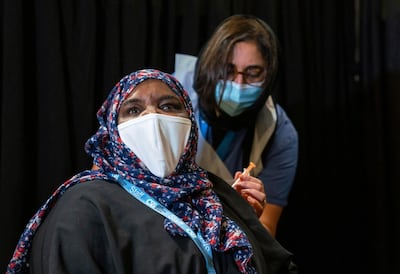Taking the Covid-19 vaccines on offer in the UK is permissible in Islam and does not invalidate fasting, the British Islamic Medical Association said.
Ramadan is expected to begin on April 12 and some Muslims have concerns about being inoculated during the holy month.
Dr Salman Waqar, a board member at Bima, said Islamic opinion on the matter was fairly unambiguous.
"Muslim scholars around the world, not only in Europe and the UK, have said that the Covid vaccines are religiously permissible and that taking a vaccine during Ramadan will not invalidate your fast."
In consultation with Islamic scholars, the organisation of Muslim healthcare professionals published guidance aimed at stemming the tide of misinformation around the topic, particularly among ethnic minority communities.
Some Muslims are worried that potential side effects might require them to break their fast, but Dr Salman, who is a GP and Academic Research Fellow at the University of Oxford, thinks catching the virus was a bigger concern.
“The decision that they need to make is should I take the vaccine, which is proven to be safe and effective and possibly experience some mild side effects that only last a day or two? Or do I risk catching Covid, which could make me quite sick, meaning I miss the whole of Ramadan?”
Mr Zahawi acknowledged that Muslims may be reluctant to receive their first shot now because the second dose would be administered during Ramadan.
The UK allows for a 12-week delay between shots, so those who receive their first dose in the next few weeks would be scheduled receive their second while they are fasting.
Medical officials are considering whether a person's ethnicity and profession should be used to determine when they receive a shot during the next stage of the staggered distribution strategy.
"We know that Muslim populations have been disproportionately hit by the Covid pandemic, both in terms of cases and deaths and the impact on lives and livelihoods. So it's important that these communities are supported in getting the vaccine," Dr Salman said.
The National Health Service Race and Health Observatory called on community and healthcare leaders to review ways of improving the demand for vaccines among minority ethnic communities.
Dr Salman, who works in a vaccine centre himself, said opening hours could be extended during Ramadan to allow people to receive a shot after sunset, when Muslims break their fast.
Effectively communicating with the Muslim community is a priority and Bima has been using social media to spread the message that vaccines are safe and religiously permissible.
“Our advice, really, is to say that the vaccine has been shown to be safe, it's been shown to be effective, so you should not delay the vaccine on the account of Ramadan," it said.
Dr Salman warned Muslims against complacency once they were vaccinated.
Traditional Ramadan customs should not be carried out as usual this year, he said.
“Ramadan is a wonderful time to spend with family and friends and in the mosque, during the night prayers, and so on," he said.
"But this year we will have to continue to be cautious, because even though people are getting the vaccine. Not enough people, not just in your city, your family, but in your country and even the world, have had the vaccine yet for us to say that we've got enough herd immunity for us to go back to the way that we used to do things.”


